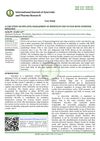 November 2023 in “Global journal of medical research”
November 2023 in “Global journal of medical research” Understanding the properties of hyaluronic acid helps improve its use in facial aging treatments.
20 citations,
March 2015 in “Archives of Plastic Surgery” Facelifts for Asians are challenging due to thicker, heavier skin.
August 2023 in “Diagnostics” Ultra-high-frequency ultrasound effectively evaluates the impact of hyaluronic acid fillers in reducing nasolabial fold wrinkles over time.
[object Object]  May 2023 in “International journal of Ayurveda and pharma research”
May 2023 in “International journal of Ayurveda and pharma research” Ayurvedic treatment helped a woman with PCOS conceive and deliver a healthy baby.
 June 2020 in “Applied sciences”
June 2020 in “Applied sciences” A new semi-automatic hair implanter could make hair transplants easier, more successful, and more accessible.
 August 2023 in “International journal of research in Ayurveda and pharmacy”
August 2023 in “International journal of research in Ayurveda and pharmacy” Ayurveda can prevent hair fall and promote regrowth using herbs and lifestyle changes.
 69 citations,
February 2002 in “International Journal of Cosmetic Science”
69 citations,
February 2002 in “International Journal of Cosmetic Science” Some hair loss can be treated, especially in women due to nutrition, but some types remain untreatable.
August 2022 in “Facial Plastic Surgery Clinics of North America” Noninvasive treatments like minoxidil, finasteride, and low-light laser therapy can help with hair loss.

Marking Nut extract in coconut oil may be an effective natural alternative for treating dandruff and promoting hair growth.
 1 citations,
October 2015 in “CRC Press eBooks”
1 citations,
October 2015 in “CRC Press eBooks” Nutricosmetics with active ingredients can help with hair loss and improve hair growth.
 10 citations,
July 2018 in “Our Dermatology Online”
10 citations,
July 2018 in “Our Dermatology Online” Some vitamins and minerals are important for preventing hair loss, but treating hair loss with them without a known deficiency is not proven effective.
 January 2016 in “Georg Thieme Verlag eBooks”
January 2016 in “Georg Thieme Verlag eBooks” Hair transplantation in East Asians needs special techniques to ensure natural results and prevent complications due to their unique hair and scalp characteristics.
 15 citations,
January 2016 in “Przeglad Menopauzalny”
15 citations,
January 2016 in “Przeglad Menopauzalny” Eating a balanced diet with specific nutrients is important for menopausal women to manage hair loss.
 1 citations,
January 2010 in “Springer eBooks”
1 citations,
January 2010 in “Springer eBooks” Certain micronutrients may improve hair and nail health, but more research is needed to confirm their benefits.
 January 2024 in “Clinical dermatology open access journal”
January 2024 in “Clinical dermatology open access journal” Hemp-derived cannabinoids can benefit skin and hair without causing a high.
[object Object]  July 2018 in “International journal of clinical & experimental dermatology”
July 2018 in “International journal of clinical & experimental dermatology” Eat a balanced diet for healthy hair; only use supplements if you have a proven nutrient deficiency.
 January 2018 in “International journal of food and nutrition research”
January 2018 in “International journal of food and nutrition research” Intermittent iron and nutritional supplements can help reduce hair loss.
 239 citations,
July 2002 in “Clinical and Experimental Dermatology”
239 citations,
July 2002 in “Clinical and Experimental Dermatology” Low iron and L-lysine levels can cause hair loss in women, and increasing these nutrients can reduce hair shedding.
 13 citations,
December 2017 in “Journal of Cosmetic and Laser Therapy”
13 citations,
December 2017 in “Journal of Cosmetic and Laser Therapy” Low-level laser therapy can stimulate hair growth more effectively than fake devices, but patient satisfaction is similar for both. Results should be taken with caution due to small study sizes and differences between studies. More research is needed.
 40 citations,
August 2018 in “Skin appendage disorders”
40 citations,
August 2018 in “Skin appendage disorders” Some alternative treatments for hair loss might work, but more research is needed.
 January 2022 in “Indian journal of dermatopathology and diagnostic dermatology”
January 2022 in “Indian journal of dermatopathology and diagnostic dermatology” Women with diffuse hair loss often have lower iron and vitamin D levels, but their thyroid function is typically normal.
4 citations,
March 2023 in “Molecules/Molecules online/Molecules annual” Gallic acid and ferulic acid can be sustainably extracted for hair supplements with high efficiency and stability.
 3 citations,
January 2017 in “Indian journal of health sciences and biomedical research KLEU”
3 citations,
January 2017 in “Indian journal of health sciences and biomedical research KLEU” Low iron levels are significantly linked to hair loss in women.
 1 citations,
August 2024 in “Pharmaceuticals”
1 citations,
August 2024 in “Pharmaceuticals” Goat placenta extract in a special delivery system improved hair growth and thickness in chemotherapy patients.
 January 2017 in “Springer eBooks”
January 2017 in “Springer eBooks” Eating a balanced diet with specific nutrients can help manage menopause symptoms and prevent related health issues.
 September 2021 in “Journal of the Egyptian Women's Dermatologic Society (Print)”
September 2021 in “Journal of the Egyptian Women's Dermatologic Society (Print)” The study concluded that low iron and vitamin D levels in women might play a role in chronic hair loss, despite no significant difference between those with and without hair loss.
 23 citations,
January 2021 in “Journal of Dermatological Science”
23 citations,
January 2021 in “Journal of Dermatological Science” The document concludes that we need more research to understand Telogen Effluvium and find effective treatments.

Monthly PRP therapy is more effective than daily minoxidil for alopecia areata.
 8 citations,
September 2021 in “Journal of Cosmetic Dermatology”
8 citations,
September 2021 in “Journal of Cosmetic Dermatology” Some diets and supplements might help with skin disorders, but their effectiveness varies and more research is needed.
 November 2021 in “Journal of pharmaceutical research international”
November 2021 in “Journal of pharmaceutical research international” Herbal depilatories are safer and cause fewer side effects than chemical ones for hair removal.


























